Advanced English Grammar: Sentence Structure and Composition
VerifiedAdded on 2023/02/02
|13
|3305
|64
Homework Assignment
AI Summary
This assignment provides a comprehensive grammar review and practice session, covering a wide range of essential English language concepts. It begins with basic sentence correction exercises, including the identification and correction of common grammatical errors. The assignment then delves into more complex topics, such as noun phrases, adjective phrases, adverb phrases, and prepositional phrases, providing examples and explanations to clarify their usage. Furthermore, the assignment explores the subjunctive mood, detailing its function and providing examples of its correct application. The exercises are designed to reinforce understanding of grammatical principles and improve writing skills, making it a valuable resource for students seeking to enhance their English language proficiency. The document is a past paper provided on Desklib, a website that provides AI based study tools for students.
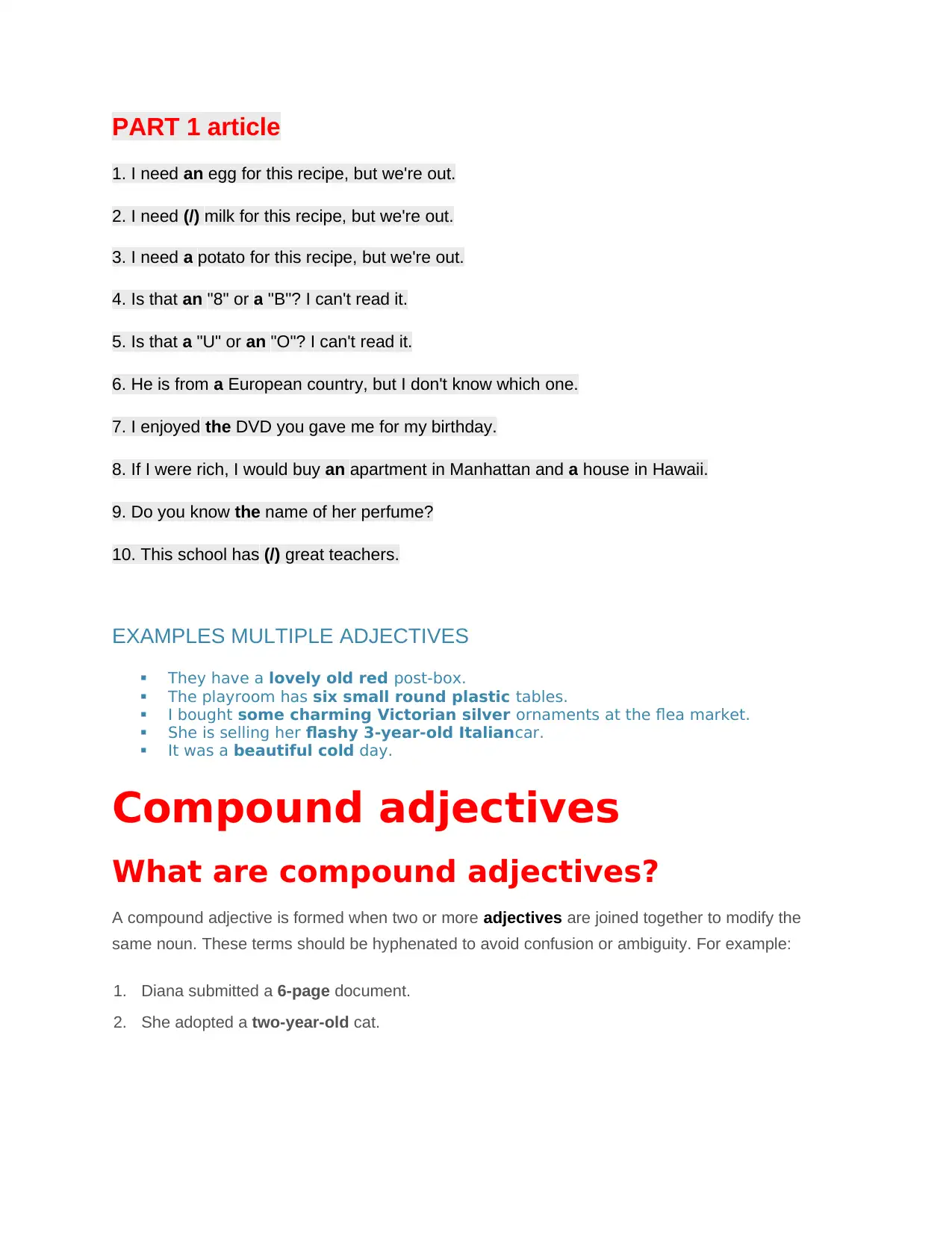
PART 1 article
1. I need an egg for this recipe, but we're out.
2. I need (/) milk for this recipe, but we're out.
3. I need a potato for this recipe, but we're out.
4. Is that an "8" or a "B"? I can't read it.
5. Is that a "U" or an "O"? I can't read it.
6. He is from a European country, but I don't know which one.
7. I enjoyed the DVD you gave me for my birthday.
8. If I were rich, I would buy an apartment in Manhattan and a house in Hawaii.
9. Do you know the name of her perfume?
10. This school has (/) great teachers.
EXAMPLES MULTIPLE ADJECTIVES
They have a lovely old red post-box.
The playroom has six small round plastic tables.
I bought some charming Victorian silver ornaments at the flea market.
She is selling her flashy 3-year-old Italiancar.
It was a beautiful cold day.
Compound adjectives
What are compound adjectives?
A compound adjective is formed when two or more adjectives are joined together to modify the
same noun. These terms should be hyphenated to avoid confusion or ambiguity. For example:
1. Diana submitted a 6-page document.
2. She adopted a two-year-old cat.
1. I need an egg for this recipe, but we're out.
2. I need (/) milk for this recipe, but we're out.
3. I need a potato for this recipe, but we're out.
4. Is that an "8" or a "B"? I can't read it.
5. Is that a "U" or an "O"? I can't read it.
6. He is from a European country, but I don't know which one.
7. I enjoyed the DVD you gave me for my birthday.
8. If I were rich, I would buy an apartment in Manhattan and a house in Hawaii.
9. Do you know the name of her perfume?
10. This school has (/) great teachers.
EXAMPLES MULTIPLE ADJECTIVES
They have a lovely old red post-box.
The playroom has six small round plastic tables.
I bought some charming Victorian silver ornaments at the flea market.
She is selling her flashy 3-year-old Italiancar.
It was a beautiful cold day.
Compound adjectives
What are compound adjectives?
A compound adjective is formed when two or more adjectives are joined together to modify the
same noun. These terms should be hyphenated to avoid confusion or ambiguity. For example:
1. Diana submitted a 6-page document.
2. She adopted a two-year-old cat.
Paraphrase This Document
Need a fresh take? Get an instant paraphrase of this document with our AI Paraphraser
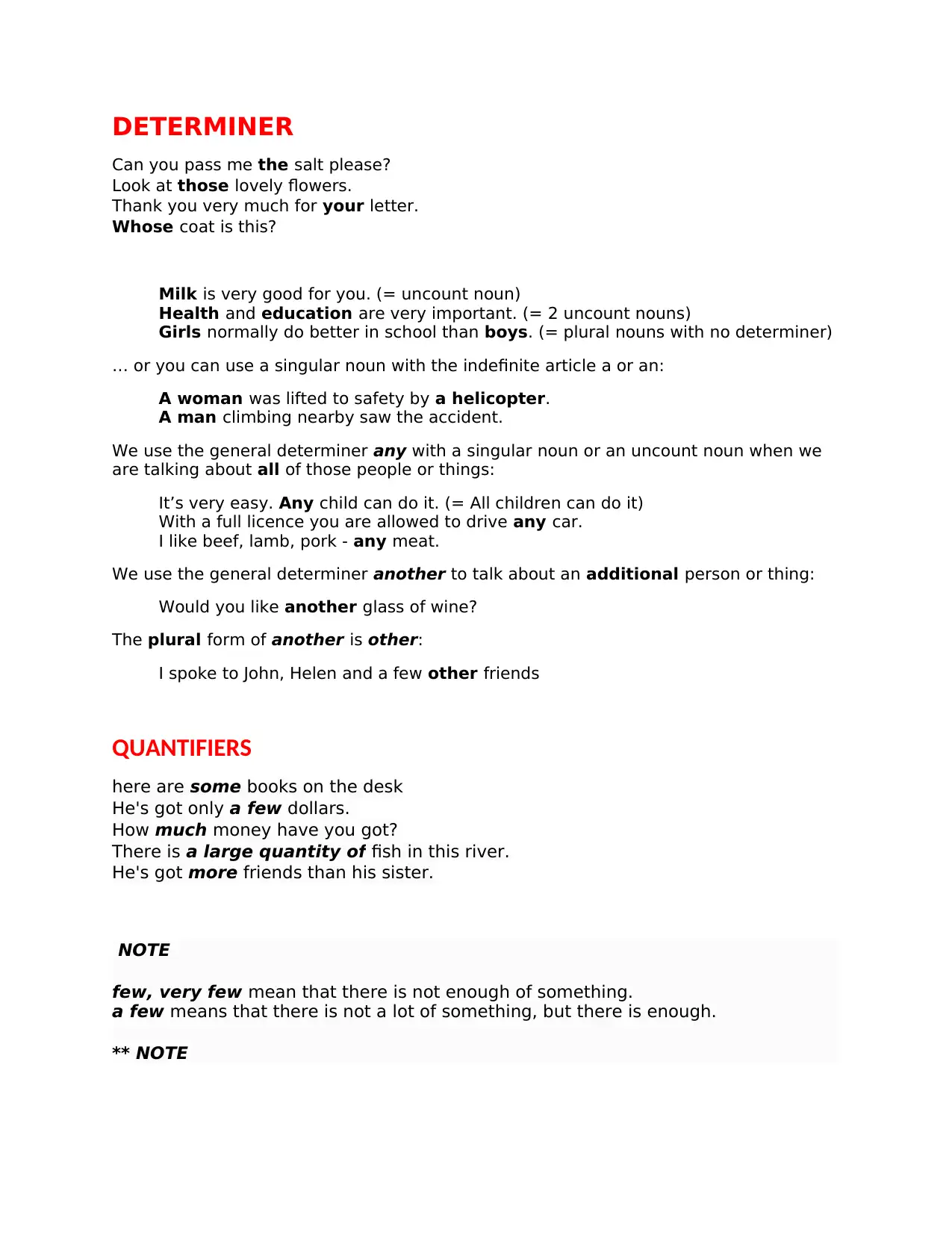
DETERMINER
Can you pass me the salt please?
Look at those lovely flowers.
Thank you very much for your letter.
Whose coat is this?
Milk is very good for you. (= uncount noun)
Health and education are very important. (= 2 uncount nouns)
Girls normally do better in school than boys. (= plural nouns with no determiner)
… or you can use a singular noun with the indefinite article a or an:
A woman was lifted to safety by a helicopter.
A man climbing nearby saw the accident.
We use the general determiner any with a singular noun or an uncount noun when we
are talking about all of those people or things:
It’s very easy. Any child can do it. (= All children can do it)
With a full licence you are allowed to drive any car.
I like beef, lamb, pork - any meat.
We use the general determiner another to talk about an additional person or thing:
Would you like another glass of wine?
The plural form of another is other:
I spoke to John, Helen and a few other friends
QUANTIFIERS
here are some books on the desk
He's got only a few dollars.
How much money have you got?
There is a large quantity of fish in this river.
He's got more friends than his sister.
NOTE
few, very few mean that there is not enough of something.
a few means that there is not a lot of something, but there is enough.
** NOTE
Can you pass me the salt please?
Look at those lovely flowers.
Thank you very much for your letter.
Whose coat is this?
Milk is very good for you. (= uncount noun)
Health and education are very important. (= 2 uncount nouns)
Girls normally do better in school than boys. (= plural nouns with no determiner)
… or you can use a singular noun with the indefinite article a or an:
A woman was lifted to safety by a helicopter.
A man climbing nearby saw the accident.
We use the general determiner any with a singular noun or an uncount noun when we
are talking about all of those people or things:
It’s very easy. Any child can do it. (= All children can do it)
With a full licence you are allowed to drive any car.
I like beef, lamb, pork - any meat.
We use the general determiner another to talk about an additional person or thing:
Would you like another glass of wine?
The plural form of another is other:
I spoke to John, Helen and a few other friends
QUANTIFIERS
here are some books on the desk
He's got only a few dollars.
How much money have you got?
There is a large quantity of fish in this river.
He's got more friends than his sister.
NOTE
few, very few mean that there is not enough of something.
a few means that there is not a lot of something, but there is enough.
** NOTE
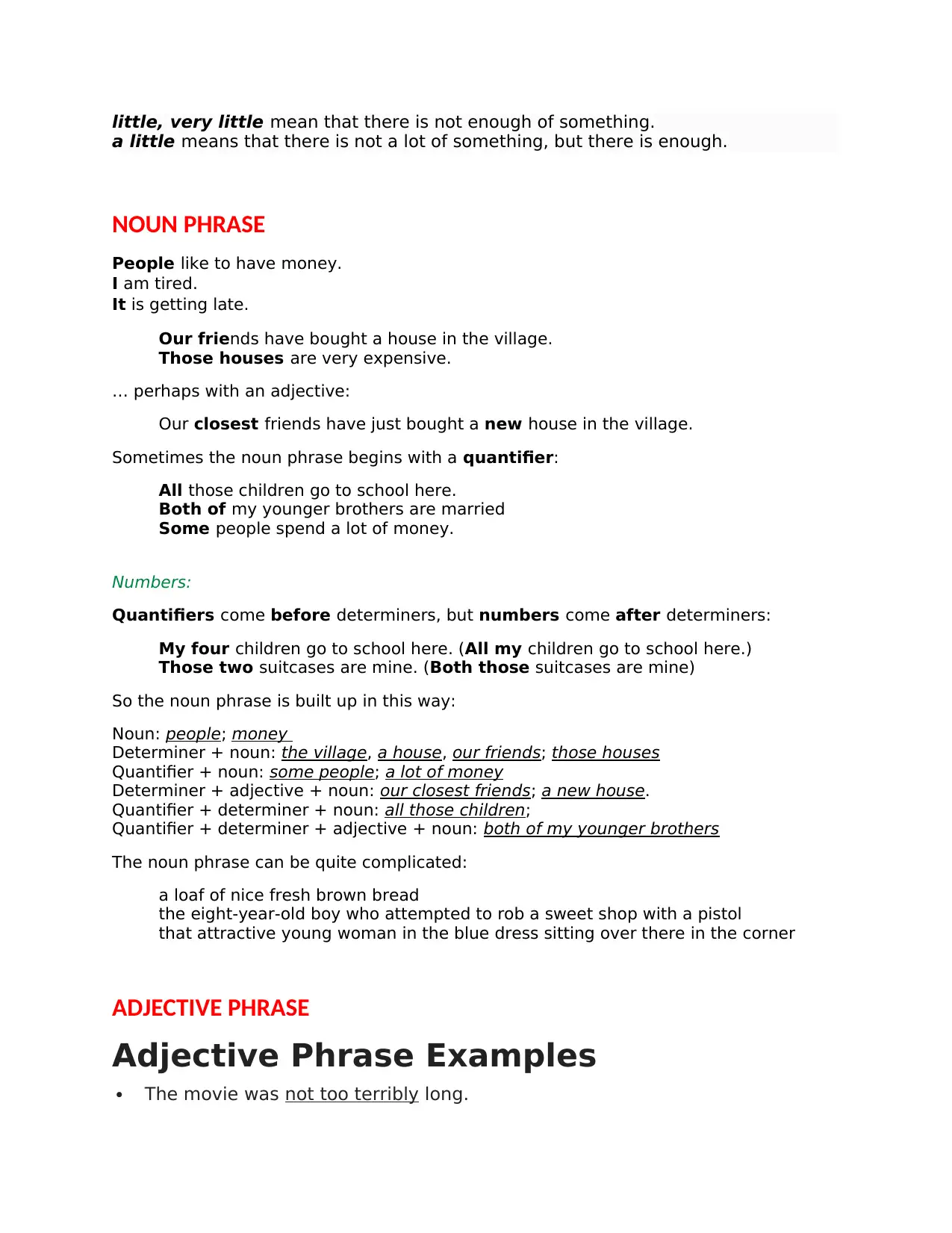
little, very little mean that there is not enough of something.
a little means that there is not a lot of something, but there is enough.
NOUN PHRASE
People like to have money.
I am tired.
It is getting late.
Our friends have bought a house in the village.
Those houses are very expensive.
… perhaps with an adjective:
Our closest friends have just bought a new house in the village.
Sometimes the noun phrase begins with a quantifier:
All those children go to school here.
Both of my younger brothers are married
Some people spend a lot of money.
Numbers:
Quantifiers come before determiners, but numbers come after determiners:
My four children go to school here. (All my children go to school here.)
Those two suitcases are mine. (Both those suitcases are mine)
So the noun phrase is built up in this way:
Noun: people; money
Determiner + noun: the village, a house, our friends; those houses
Quantifier + noun: some people; a lot of money
Determiner + adjective + noun: our closest friends; a new house.
Quantifier + determiner + noun: all those children;
Quantifier + determiner + adjective + noun: both of my younger brothers
The noun phrase can be quite complicated:
a loaf of nice fresh brown bread
the eight-year-old boy who attempted to rob a sweet shop with a pistol
that attractive young woman in the blue dress sitting over there in the corner
ADJECTIVE PHRASE
Adjective Phrase Examples
The movie was not too terribly long.
a little means that there is not a lot of something, but there is enough.
NOUN PHRASE
People like to have money.
I am tired.
It is getting late.
Our friends have bought a house in the village.
Those houses are very expensive.
… perhaps with an adjective:
Our closest friends have just bought a new house in the village.
Sometimes the noun phrase begins with a quantifier:
All those children go to school here.
Both of my younger brothers are married
Some people spend a lot of money.
Numbers:
Quantifiers come before determiners, but numbers come after determiners:
My four children go to school here. (All my children go to school here.)
Those two suitcases are mine. (Both those suitcases are mine)
So the noun phrase is built up in this way:
Noun: people; money
Determiner + noun: the village, a house, our friends; those houses
Quantifier + noun: some people; a lot of money
Determiner + adjective + noun: our closest friends; a new house.
Quantifier + determiner + noun: all those children;
Quantifier + determiner + adjective + noun: both of my younger brothers
The noun phrase can be quite complicated:
a loaf of nice fresh brown bread
the eight-year-old boy who attempted to rob a sweet shop with a pistol
that attractive young woman in the blue dress sitting over there in the corner
ADJECTIVE PHRASE
Adjective Phrase Examples
The movie was not too terribly long.
⊘ This is a preview!⊘
Do you want full access?
Subscribe today to unlock all pages.

Trusted by 1+ million students worldwide
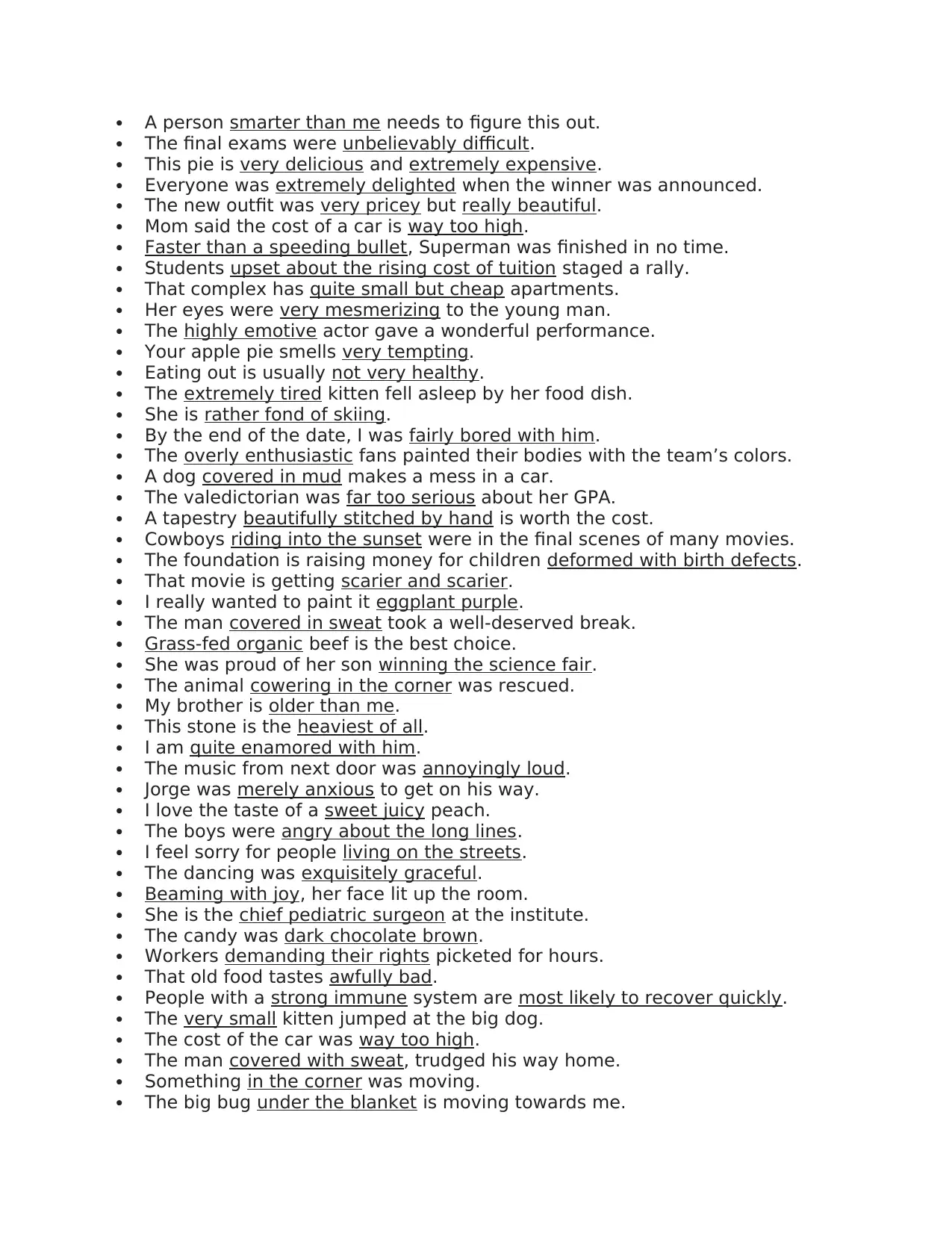
A person smarter than me needs to figure this out.
The final exams were unbelievably difficult.
This pie is very delicious and extremely expensive.
Everyone was extremely delighted when the winner was announced.
The new outfit was very pricey but really beautiful.
Mom said the cost of a car is way too high.
Faster than a speeding bullet, Superman was finished in no time.
Students upset about the rising cost of tuition staged a rally.
That complex has quite small but cheap apartments.
Her eyes were very mesmerizing to the young man.
The highly emotive actor gave a wonderful performance.
Your apple pie smells very tempting.
Eating out is usually not very healthy.
The extremely tired kitten fell asleep by her food dish.
She is rather fond of skiing.
By the end of the date, I was fairly bored with him.
The overly enthusiastic fans painted their bodies with the team’s colors.
A dog covered in mud makes a mess in a car.
The valedictorian was far too serious about her GPA.
A tapestry beautifully stitched by hand is worth the cost.
Cowboys riding into the sunset were in the final scenes of many movies.
The foundation is raising money for children deformed with birth defects.
That movie is getting scarier and scarier.
I really wanted to paint it eggplant purple.
The man covered in sweat took a well-deserved break.
Grass-fed organic beef is the best choice.
She was proud of her son winning the science fair.
The animal cowering in the corner was rescued.
My brother is older than me.
This stone is the heaviest of all.
I am quite enamored with him.
The music from next door was annoyingly loud.
Jorge was merely anxious to get on his way.
I love the taste of a sweet juicy peach.
The boys were angry about the long lines.
I feel sorry for people living on the streets.
The dancing was exquisitely graceful.
Beaming with joy, her face lit up the room.
She is the chief pediatric surgeon at the institute.
The candy was dark chocolate brown.
Workers demanding their rights picketed for hours.
That old food tastes awfully bad.
People with a strong immune system are most likely to recover quickly.
The very small kitten jumped at the big dog.
The cost of the car was way too high.
The man covered with sweat, trudged his way home.
Something in the corner was moving.
The big bug under the blanket is moving towards me.
The final exams were unbelievably difficult.
This pie is very delicious and extremely expensive.
Everyone was extremely delighted when the winner was announced.
The new outfit was very pricey but really beautiful.
Mom said the cost of a car is way too high.
Faster than a speeding bullet, Superman was finished in no time.
Students upset about the rising cost of tuition staged a rally.
That complex has quite small but cheap apartments.
Her eyes were very mesmerizing to the young man.
The highly emotive actor gave a wonderful performance.
Your apple pie smells very tempting.
Eating out is usually not very healthy.
The extremely tired kitten fell asleep by her food dish.
She is rather fond of skiing.
By the end of the date, I was fairly bored with him.
The overly enthusiastic fans painted their bodies with the team’s colors.
A dog covered in mud makes a mess in a car.
The valedictorian was far too serious about her GPA.
A tapestry beautifully stitched by hand is worth the cost.
Cowboys riding into the sunset were in the final scenes of many movies.
The foundation is raising money for children deformed with birth defects.
That movie is getting scarier and scarier.
I really wanted to paint it eggplant purple.
The man covered in sweat took a well-deserved break.
Grass-fed organic beef is the best choice.
She was proud of her son winning the science fair.
The animal cowering in the corner was rescued.
My brother is older than me.
This stone is the heaviest of all.
I am quite enamored with him.
The music from next door was annoyingly loud.
Jorge was merely anxious to get on his way.
I love the taste of a sweet juicy peach.
The boys were angry about the long lines.
I feel sorry for people living on the streets.
The dancing was exquisitely graceful.
Beaming with joy, her face lit up the room.
She is the chief pediatric surgeon at the institute.
The candy was dark chocolate brown.
Workers demanding their rights picketed for hours.
That old food tastes awfully bad.
People with a strong immune system are most likely to recover quickly.
The very small kitten jumped at the big dog.
The cost of the car was way too high.
The man covered with sweat, trudged his way home.
Something in the corner was moving.
The big bug under the blanket is moving towards me.
Paraphrase This Document
Need a fresh take? Get an instant paraphrase of this document with our AI Paraphraser
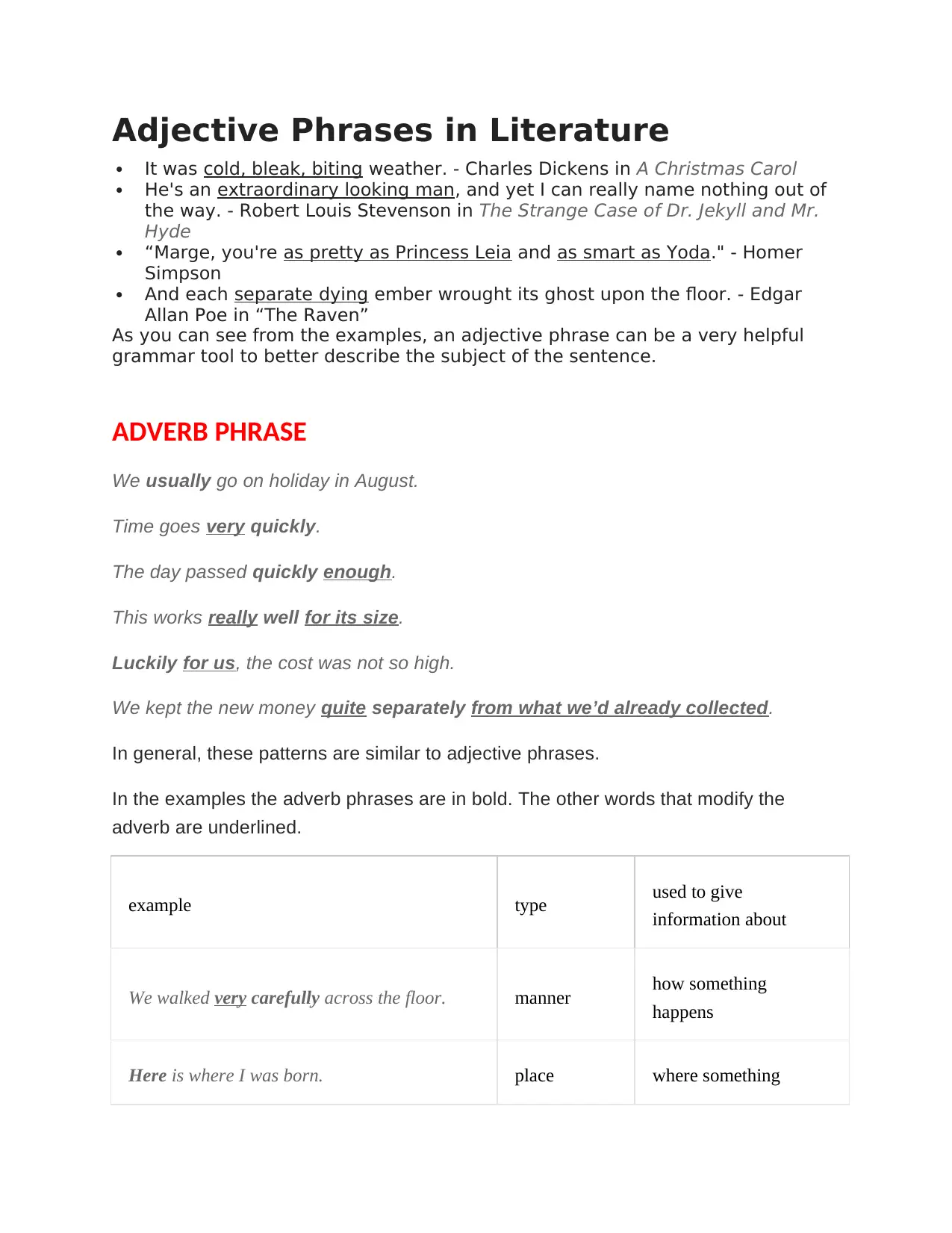
Adjective Phrases in Literature
It was cold, bleak, biting weather. - Charles Dickens in A Christmas Carol
He's an extraordinary looking man, and yet I can really name nothing out of
the way. - Robert Louis Stevenson in The Strange Case of Dr. Jekyll and Mr.
Hyde
“Marge, you're as pretty as Princess Leia and as smart as Yoda." - Homer
Simpson
And each separate dying ember wrought its ghost upon the floor. - Edgar
Allan Poe in “The Raven”
As you can see from the examples, an adjective phrase can be a very helpful
grammar tool to better describe the subject of the sentence.
ADVERB PHRASE
We usually go on holiday in August.
Time goes very quickly.
The day passed quickly enough.
This works really well for its size.
Luckily for us, the cost was not so high.
We kept the new money quite separately from what we’d already collected.
In general, these patterns are similar to adjective phrases.
In the examples the adverb phrases are in bold. The other words that modify the
adverb are underlined.
example type used to give
information about
We walked very carefully across the floor. manner how something
happens
Here is where I was born. place where something
It was cold, bleak, biting weather. - Charles Dickens in A Christmas Carol
He's an extraordinary looking man, and yet I can really name nothing out of
the way. - Robert Louis Stevenson in The Strange Case of Dr. Jekyll and Mr.
Hyde
“Marge, you're as pretty as Princess Leia and as smart as Yoda." - Homer
Simpson
And each separate dying ember wrought its ghost upon the floor. - Edgar
Allan Poe in “The Raven”
As you can see from the examples, an adjective phrase can be a very helpful
grammar tool to better describe the subject of the sentence.
ADVERB PHRASE
We usually go on holiday in August.
Time goes very quickly.
The day passed quickly enough.
This works really well for its size.
Luckily for us, the cost was not so high.
We kept the new money quite separately from what we’d already collected.
In general, these patterns are similar to adjective phrases.
In the examples the adverb phrases are in bold. The other words that modify the
adverb are underlined.
example type used to give
information about
We walked very carefully across the floor. manner how something
happens
Here is where I was born. place where something
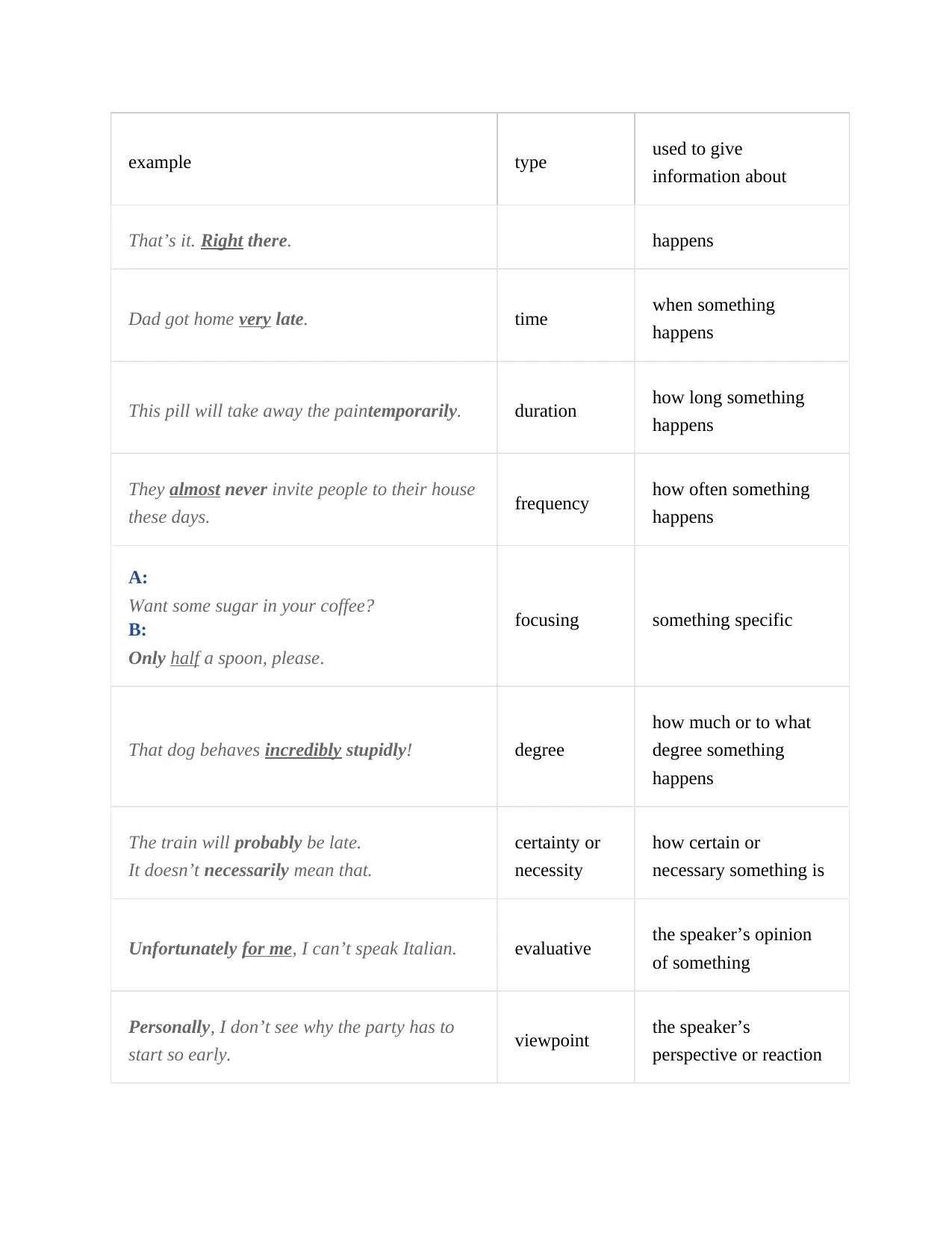
example type used to give
information about
That’s it. Right there. happens
Dad got home very late. time when something
happens
This pill will take away the paintemporarily. duration how long something
happens
They almost never invite people to their house
these days. frequency how often something
happens
A:
Want some sugar in your coffee?
B:
Only half a spoon, please.
focusing something specific
That dog behaves incredibly stupidly! degree
how much or to what
degree something
happens
The train will probably be late.
It doesn’t necessarily mean that.
certainty or
necessity
how certain or
necessary something is
Unfortunately for me, I can’t speak Italian. evaluative the speaker’s opinion
of something
Personally, I don’t see why the party has to
start so early. viewpoint the speaker’s
perspective or reaction
information about
That’s it. Right there. happens
Dad got home very late. time when something
happens
This pill will take away the paintemporarily. duration how long something
happens
They almost never invite people to their house
these days. frequency how often something
happens
A:
Want some sugar in your coffee?
B:
Only half a spoon, please.
focusing something specific
That dog behaves incredibly stupidly! degree
how much or to what
degree something
happens
The train will probably be late.
It doesn’t necessarily mean that.
certainty or
necessity
how certain or
necessary something is
Unfortunately for me, I can’t speak Italian. evaluative the speaker’s opinion
of something
Personally, I don’t see why the party has to
start so early. viewpoint the speaker’s
perspective or reaction
⊘ This is a preview!⊘
Do you want full access?
Subscribe today to unlock all pages.

Trusted by 1+ million students worldwide
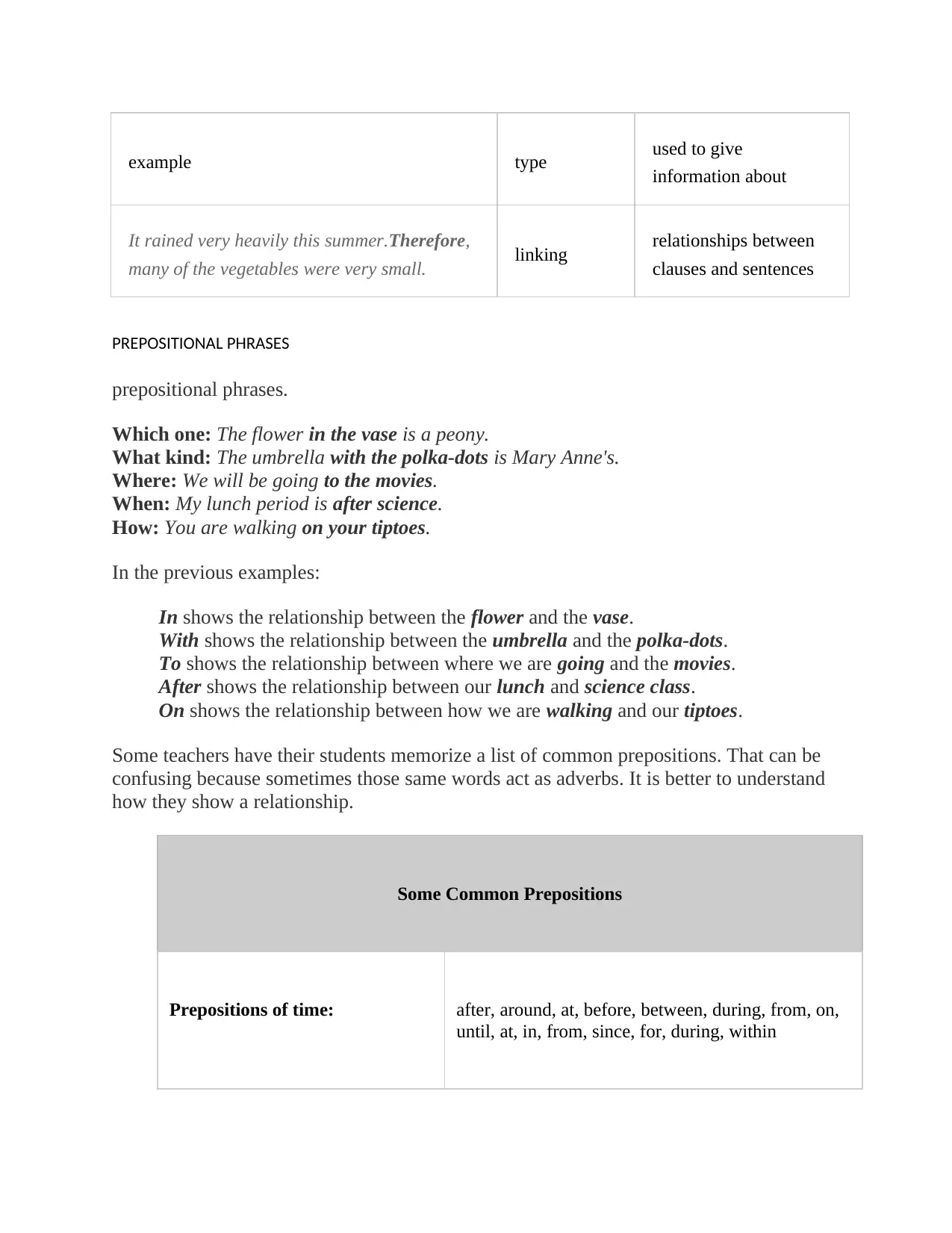
example type used to give
information about
It rained very heavily this summer.Therefore,
many of the vegetables were very small. linking relationships between
clauses and sentences
PREPOSITIONAL PHRASES
prepositional phrases.
Which one: The flower in the vase is a peony.
What kind: The umbrella with the polka-dots is Mary Anne's.
Where: We will be going to the movies.
When: My lunch period is after science.
How: You are walking on your tiptoes.
In the previous examples:
In shows the relationship between the flower and the vase.
With shows the relationship between the umbrella and the polka-dots.
To shows the relationship between where we are going and the movies.
After shows the relationship between our lunch and science class.
On shows the relationship between how we are walking and our tiptoes.
Some teachers have their students memorize a list of common prepositions. That can be
confusing because sometimes those same words act as adverbs. It is better to understand
how they show a relationship.
Some Common Prepositions
Prepositions of time: after, around, at, before, between, during, from, on,
until, at, in, from, since, for, during, within
information about
It rained very heavily this summer.Therefore,
many of the vegetables were very small. linking relationships between
clauses and sentences
PREPOSITIONAL PHRASES
prepositional phrases.
Which one: The flower in the vase is a peony.
What kind: The umbrella with the polka-dots is Mary Anne's.
Where: We will be going to the movies.
When: My lunch period is after science.
How: You are walking on your tiptoes.
In the previous examples:
In shows the relationship between the flower and the vase.
With shows the relationship between the umbrella and the polka-dots.
To shows the relationship between where we are going and the movies.
After shows the relationship between our lunch and science class.
On shows the relationship between how we are walking and our tiptoes.
Some teachers have their students memorize a list of common prepositions. That can be
confusing because sometimes those same words act as adverbs. It is better to understand
how they show a relationship.
Some Common Prepositions
Prepositions of time: after, around, at, before, between, during, from, on,
until, at, in, from, since, for, during, within
Paraphrase This Document
Need a fresh take? Get an instant paraphrase of this document with our AI Paraphraser
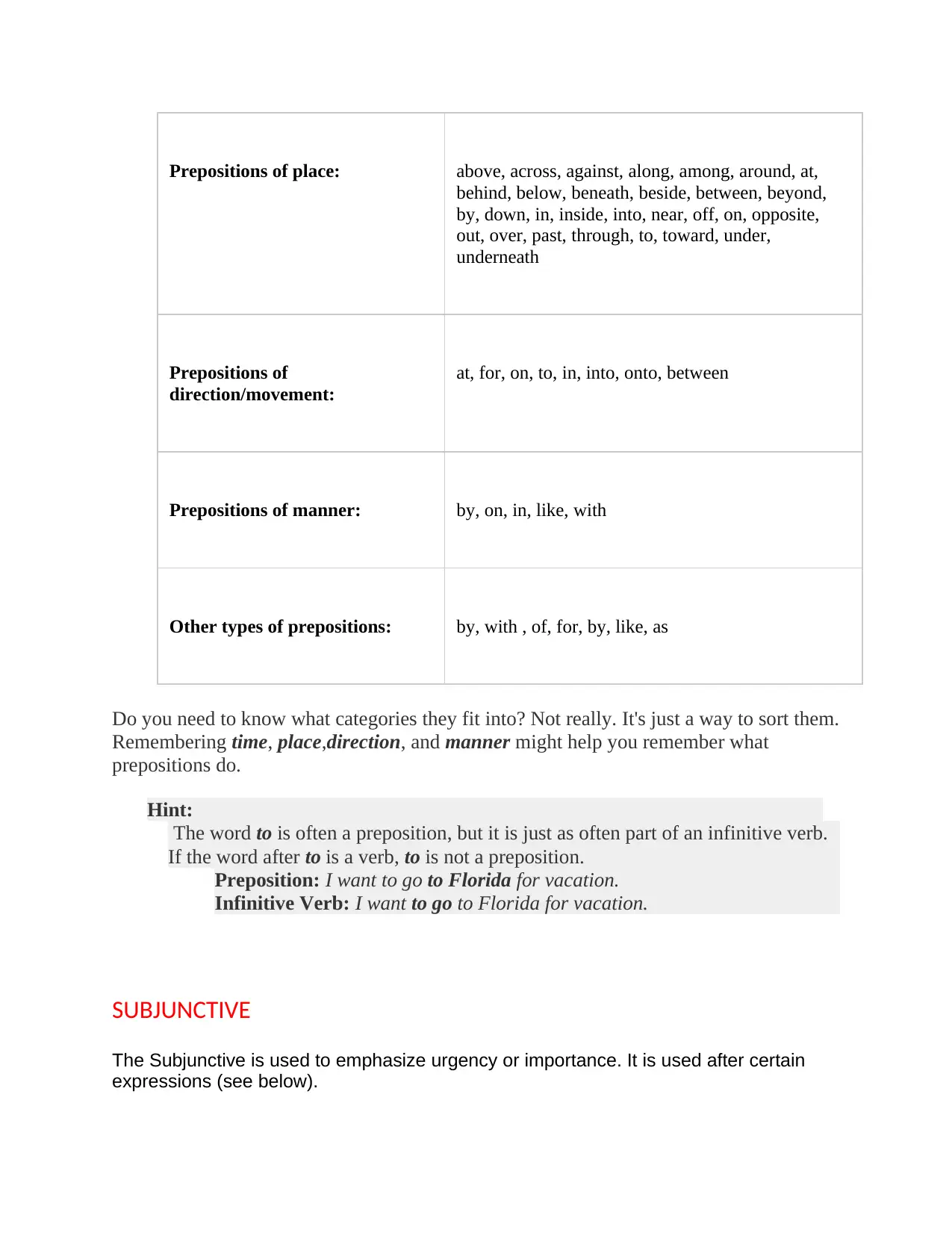
Prepositions of place: above, across, against, along, among, around, at,
behind, below, beneath, beside, between, beyond,
by, down, in, inside, into, near, off, on, opposite,
out, over, past, through, to, toward, under,
underneath
Prepositions of
direction/movement:
at, for, on, to, in, into, onto, between
Prepositions of manner: by, on, in, like, with
Other types of prepositions: by, with , of, for, by, like, as
Do you need to know what categories they fit into? Not really. It's just a way to sort them.
Remembering time, place,direction, and manner might help you remember what
prepositions do.
Hint:
The word to is often a preposition, but it is just as often part of an infinitive verb.
If the word after to is a verb, to is not a preposition.
Preposition: I want to go to Florida for vacation.
Infinitive Verb: I want to go to Florida for vacation.
SUBJUNCTIVE
The Subjunctive is used to emphasize urgency or importance. It is used after certain
expressions (see below).
behind, below, beneath, beside, between, beyond,
by, down, in, inside, into, near, off, on, opposite,
out, over, past, through, to, toward, under,
underneath
Prepositions of
direction/movement:
at, for, on, to, in, into, onto, between
Prepositions of manner: by, on, in, like, with
Other types of prepositions: by, with , of, for, by, like, as
Do you need to know what categories they fit into? Not really. It's just a way to sort them.
Remembering time, place,direction, and manner might help you remember what
prepositions do.
Hint:
The word to is often a preposition, but it is just as often part of an infinitive verb.
If the word after to is a verb, to is not a preposition.
Preposition: I want to go to Florida for vacation.
Infinitive Verb: I want to go to Florida for vacation.
SUBJUNCTIVE
The Subjunctive is used to emphasize urgency or importance. It is used after certain
expressions (see below).
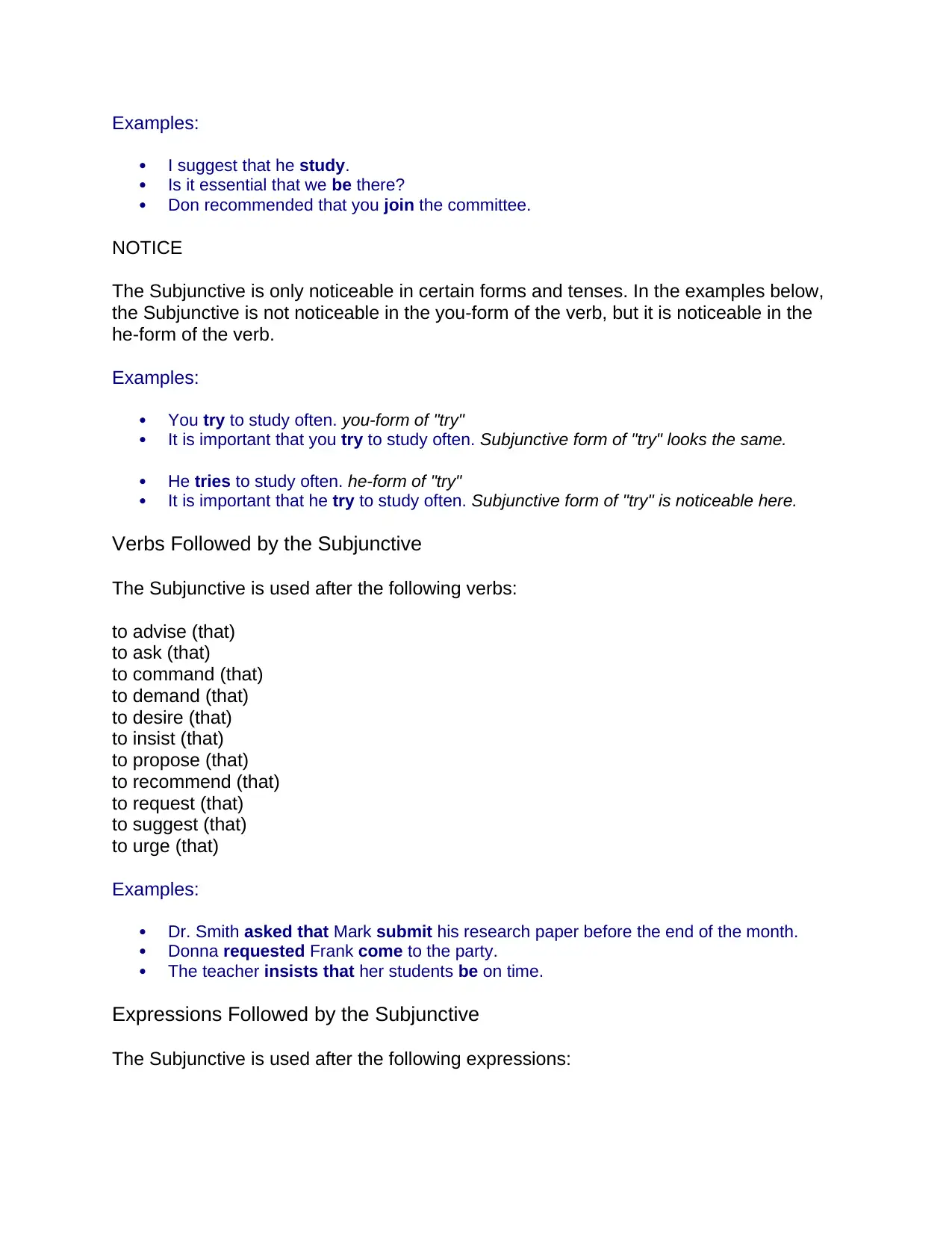
Examples:
I suggest that he study.
Is it essential that we be there?
Don recommended that you join the committee.
NOTICE
The Subjunctive is only noticeable in certain forms and tenses. In the examples below,
the Subjunctive is not noticeable in the you-form of the verb, but it is noticeable in the
he-form of the verb.
Examples:
You try to study often. you-form of "try"
It is important that you try to study often. Subjunctive form of "try" looks the same.
He tries to study often. he-form of "try"
It is important that he try to study often. Subjunctive form of "try" is noticeable here.
Verbs Followed by the Subjunctive
The Subjunctive is used after the following verbs:
to advise (that)
to ask (that)
to command (that)
to demand (that)
to desire (that)
to insist (that)
to propose (that)
to recommend (that)
to request (that)
to suggest (that)
to urge (that)
Examples:
Dr. Smith asked that Mark submit his research paper before the end of the month.
Donna requested Frank come to the party.
The teacher insists that her students be on time.
Expressions Followed by the Subjunctive
The Subjunctive is used after the following expressions:
I suggest that he study.
Is it essential that we be there?
Don recommended that you join the committee.
NOTICE
The Subjunctive is only noticeable in certain forms and tenses. In the examples below,
the Subjunctive is not noticeable in the you-form of the verb, but it is noticeable in the
he-form of the verb.
Examples:
You try to study often. you-form of "try"
It is important that you try to study often. Subjunctive form of "try" looks the same.
He tries to study often. he-form of "try"
It is important that he try to study often. Subjunctive form of "try" is noticeable here.
Verbs Followed by the Subjunctive
The Subjunctive is used after the following verbs:
to advise (that)
to ask (that)
to command (that)
to demand (that)
to desire (that)
to insist (that)
to propose (that)
to recommend (that)
to request (that)
to suggest (that)
to urge (that)
Examples:
Dr. Smith asked that Mark submit his research paper before the end of the month.
Donna requested Frank come to the party.
The teacher insists that her students be on time.
Expressions Followed by the Subjunctive
The Subjunctive is used after the following expressions:
⊘ This is a preview!⊘
Do you want full access?
Subscribe today to unlock all pages.

Trusted by 1+ million students worldwide
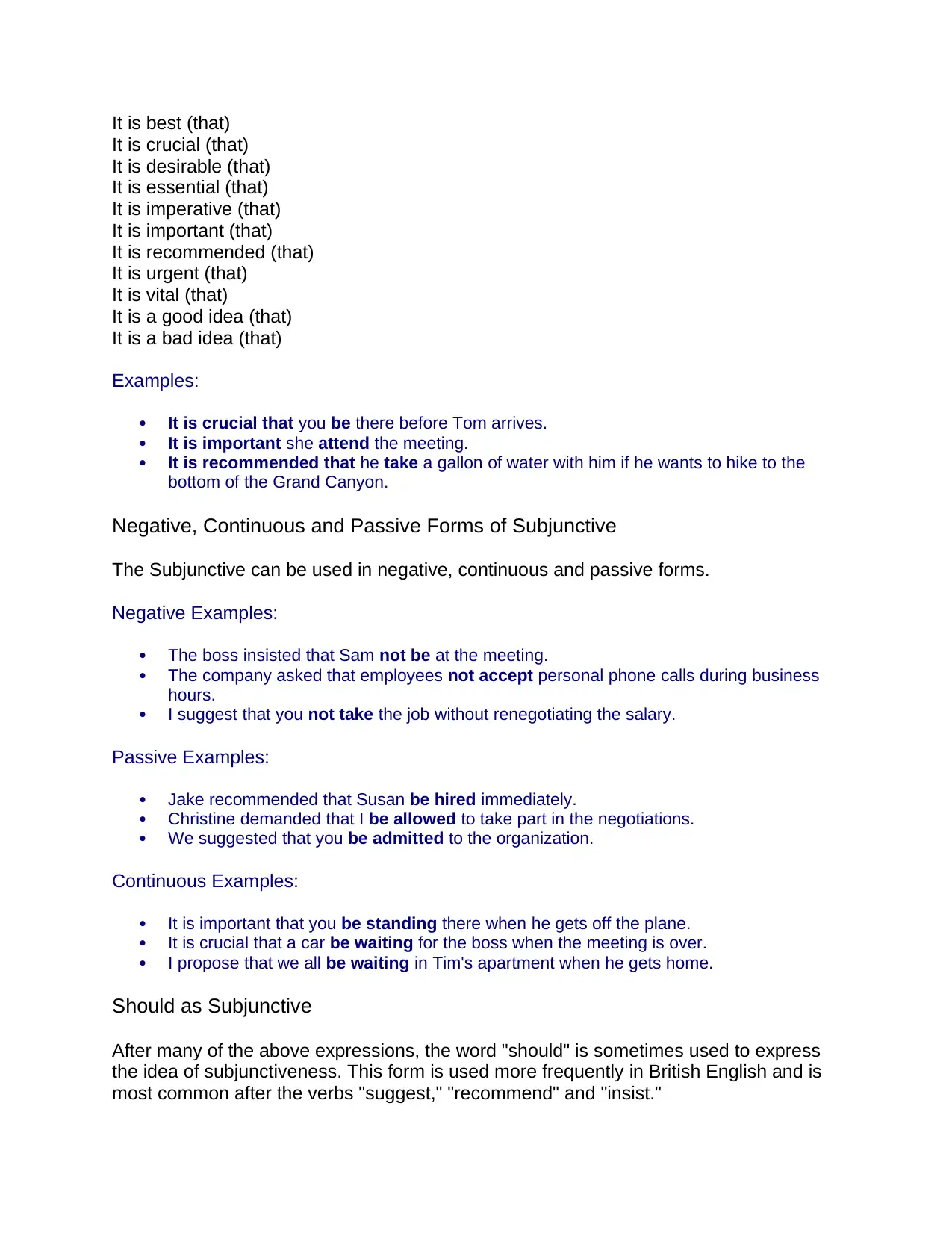
It is best (that)
It is crucial (that)
It is desirable (that)
It is essential (that)
It is imperative (that)
It is important (that)
It is recommended (that)
It is urgent (that)
It is vital (that)
It is a good idea (that)
It is a bad idea (that)
Examples:
It is crucial that you be there before Tom arrives.
It is important she attend the meeting.
It is recommended that he take a gallon of water with him if he wants to hike to the
bottom of the Grand Canyon.
Negative, Continuous and Passive Forms of Subjunctive
The Subjunctive can be used in negative, continuous and passive forms.
Negative Examples:
The boss insisted that Sam not be at the meeting.
The company asked that employees not accept personal phone calls during business
hours.
I suggest that you not take the job without renegotiating the salary.
Passive Examples:
Jake recommended that Susan be hired immediately.
Christine demanded that I be allowed to take part in the negotiations.
We suggested that you be admitted to the organization.
Continuous Examples:
It is important that you be standing there when he gets off the plane.
It is crucial that a car be waiting for the boss when the meeting is over.
I propose that we all be waiting in Tim's apartment when he gets home.
Should as Subjunctive
After many of the above expressions, the word "should" is sometimes used to express
the idea of subjunctiveness. This form is used more frequently in British English and is
most common after the verbs "suggest," "recommend" and "insist."
It is crucial (that)
It is desirable (that)
It is essential (that)
It is imperative (that)
It is important (that)
It is recommended (that)
It is urgent (that)
It is vital (that)
It is a good idea (that)
It is a bad idea (that)
Examples:
It is crucial that you be there before Tom arrives.
It is important she attend the meeting.
It is recommended that he take a gallon of water with him if he wants to hike to the
bottom of the Grand Canyon.
Negative, Continuous and Passive Forms of Subjunctive
The Subjunctive can be used in negative, continuous and passive forms.
Negative Examples:
The boss insisted that Sam not be at the meeting.
The company asked that employees not accept personal phone calls during business
hours.
I suggest that you not take the job without renegotiating the salary.
Passive Examples:
Jake recommended that Susan be hired immediately.
Christine demanded that I be allowed to take part in the negotiations.
We suggested that you be admitted to the organization.
Continuous Examples:
It is important that you be standing there when he gets off the plane.
It is crucial that a car be waiting for the boss when the meeting is over.
I propose that we all be waiting in Tim's apartment when he gets home.
Should as Subjunctive
After many of the above expressions, the word "should" is sometimes used to express
the idea of subjunctiveness. This form is used more frequently in British English and is
most common after the verbs "suggest," "recommend" and "insist."
Paraphrase This Document
Need a fresh take? Get an instant paraphrase of this document with our AI Paraphraser
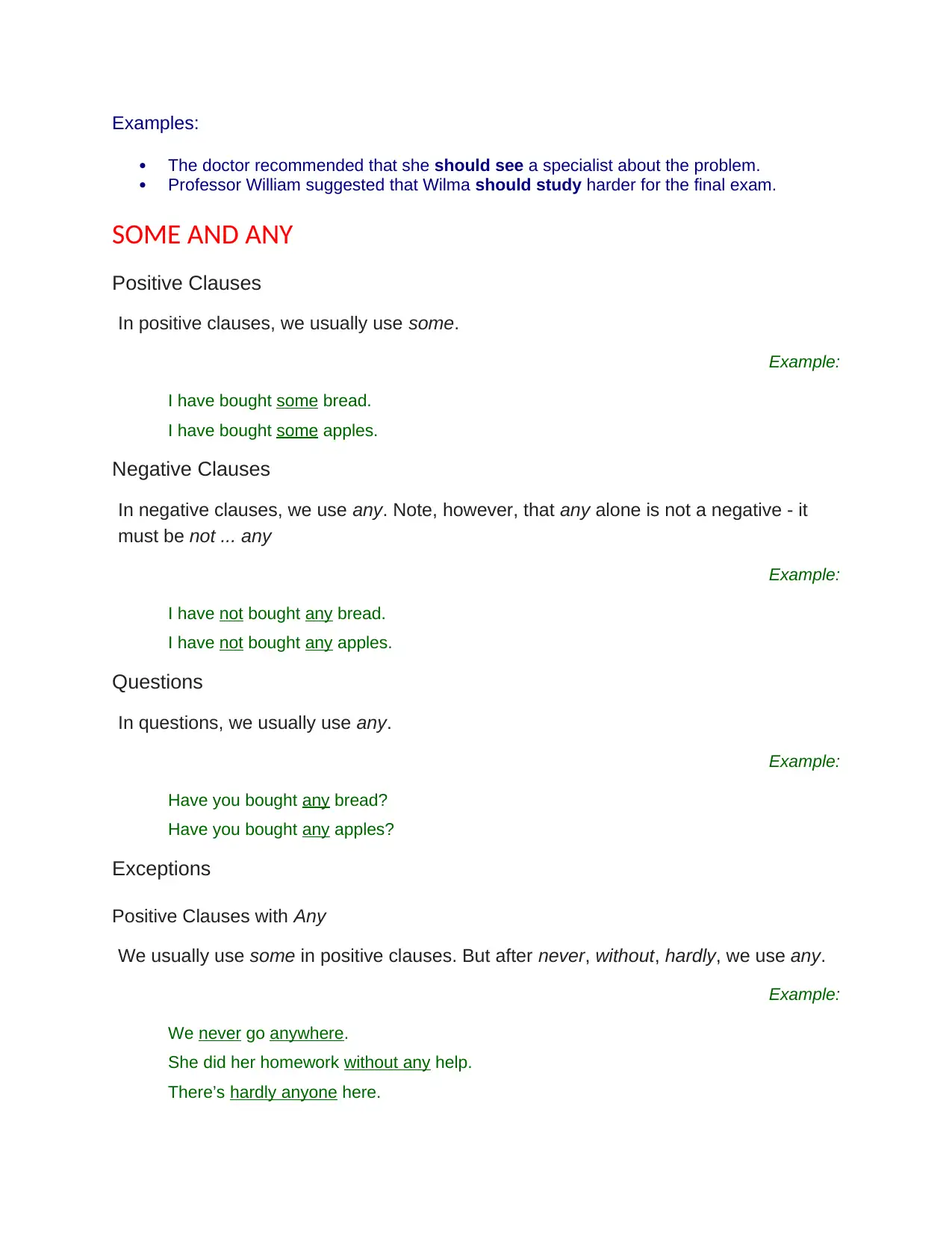
Examples:
The doctor recommended that she should see a specialist about the problem.
Professor William suggested that Wilma should study harder for the final exam.
SOME AND ANY
Positive Clauses
In positive clauses, we usually use some.
Example:
I have bought some bread.
I have bought some apples.
Negative Clauses
In negative clauses, we use any. Note, however, that any alone is not a negative - it
must be not ... any
Example:
I have not bought any bread.
I have not bought any apples.
Questions
In questions, we usually use any.
Example:
Have you bought any bread?
Have you bought any apples?
Exceptions
Positive Clauses with Any
We usually use some in positive clauses. But after never, without, hardly, we use any.
Example:
We never go anywhere.
She did her homework without any help.
There’s hardly anyone here.
The doctor recommended that she should see a specialist about the problem.
Professor William suggested that Wilma should study harder for the final exam.
SOME AND ANY
Positive Clauses
In positive clauses, we usually use some.
Example:
I have bought some bread.
I have bought some apples.
Negative Clauses
In negative clauses, we use any. Note, however, that any alone is not a negative - it
must be not ... any
Example:
I have not bought any bread.
I have not bought any apples.
Questions
In questions, we usually use any.
Example:
Have you bought any bread?
Have you bought any apples?
Exceptions
Positive Clauses with Any
We usually use some in positive clauses. But after never, without, hardly, we use any.
Example:
We never go anywhere.
She did her homework without any help.
There’s hardly anyone here.
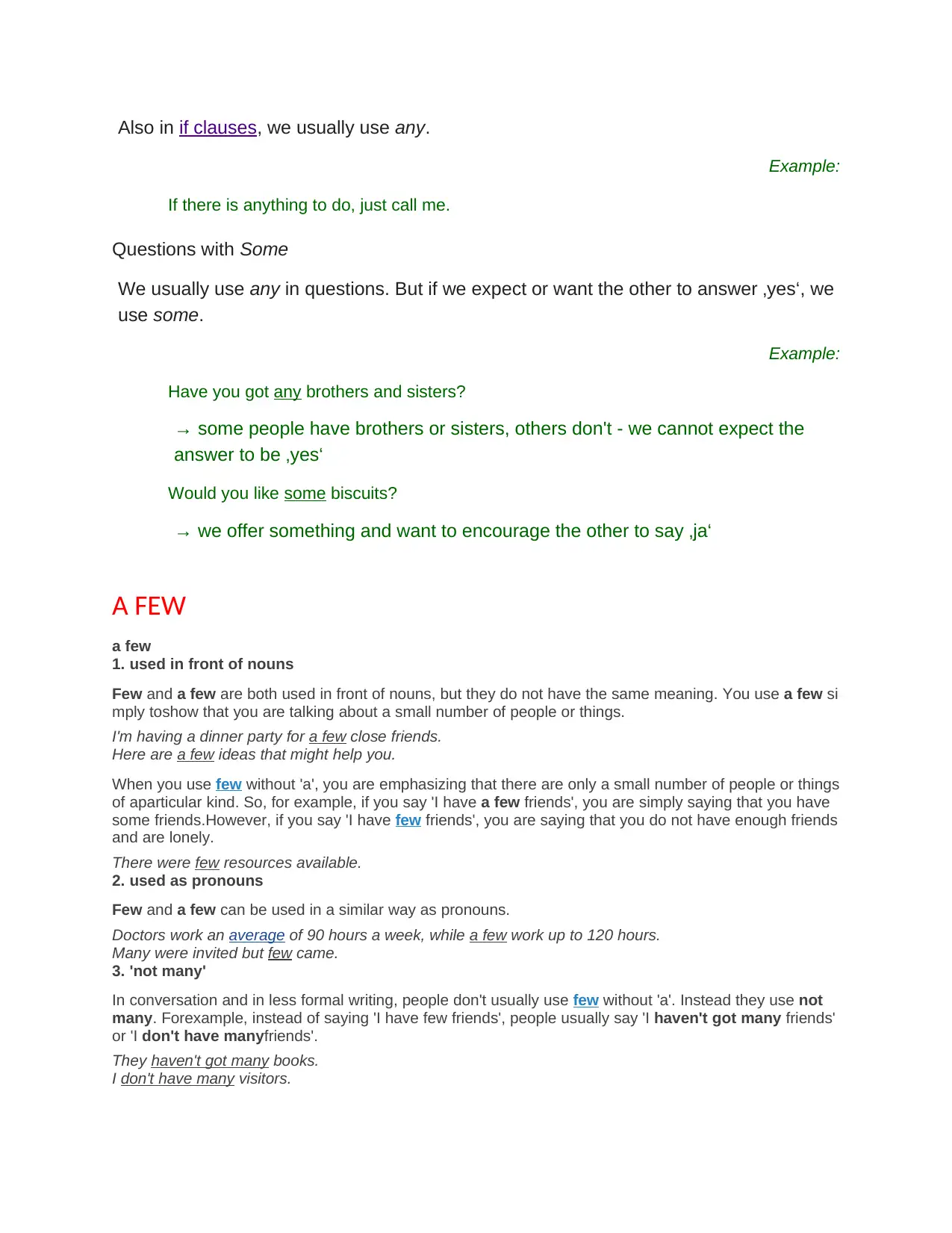
Also in if clauses, we usually use any.
Example:
If there is anything to do, just call me.
Questions with Some
We usually use any in questions. But if we expect or want the other to answer ‚yes‘, we
use some.
Example:
Have you got any brothers and sisters?
→ some people have brothers or sisters, others don't - we cannot expect the
answer to be ‚yes‘
Would you like some biscuits?
→ we offer something and want to encourage the other to say ‚ja‘
A FEW
a few
1. used in front of nouns
Few and a few are both used in front of nouns, but they do not have the same meaning. You use a few si
mply toshow that you are talking about a small number of people or things.
I'm having a dinner party for a few close friends.
Here are a few ideas that might help you.
When you use few without 'a', you are emphasizing that there are only a small number of people or things
of aparticular kind. So, for example, if you say 'I have a few friends', you are simply saying that you have
some friends.However, if you say 'I have few friends', you are saying that you do not have enough friends
and are lonely.
There were few resources available.
2. used as pronouns
Few and a few can be used in a similar way as pronouns.
Doctors work an average of 90 hours a week, while a few work up to 120 hours.
Many were invited but few came.
3. 'not many'
In conversation and in less formal writing, people don't usually use few without 'a'. Instead they use not
many. Forexample, instead of saying 'I have few friends', people usually say 'I haven't got many friends'
or 'I don't have manyfriends'.
They haven't got many books.
I don't have many visitors.
Example:
If there is anything to do, just call me.
Questions with Some
We usually use any in questions. But if we expect or want the other to answer ‚yes‘, we
use some.
Example:
Have you got any brothers and sisters?
→ some people have brothers or sisters, others don't - we cannot expect the
answer to be ‚yes‘
Would you like some biscuits?
→ we offer something and want to encourage the other to say ‚ja‘
A FEW
a few
1. used in front of nouns
Few and a few are both used in front of nouns, but they do not have the same meaning. You use a few si
mply toshow that you are talking about a small number of people or things.
I'm having a dinner party for a few close friends.
Here are a few ideas that might help you.
When you use few without 'a', you are emphasizing that there are only a small number of people or things
of aparticular kind. So, for example, if you say 'I have a few friends', you are simply saying that you have
some friends.However, if you say 'I have few friends', you are saying that you do not have enough friends
and are lonely.
There were few resources available.
2. used as pronouns
Few and a few can be used in a similar way as pronouns.
Doctors work an average of 90 hours a week, while a few work up to 120 hours.
Many were invited but few came.
3. 'not many'
In conversation and in less formal writing, people don't usually use few without 'a'. Instead they use not
many. Forexample, instead of saying 'I have few friends', people usually say 'I haven't got many friends'
or 'I don't have manyfriends'.
They haven't got many books.
I don't have many visitors.
⊘ This is a preview!⊘
Do you want full access?
Subscribe today to unlock all pages.

Trusted by 1+ million students worldwide
1 out of 13
Your All-in-One AI-Powered Toolkit for Academic Success.
+13062052269
info@desklib.com
Available 24*7 on WhatsApp / Email
![[object Object]](/_next/static/media/star-bottom.7253800d.svg)
Unlock your academic potential
Copyright © 2020–2026 A2Z Services. All Rights Reserved. Developed and managed by ZUCOL.